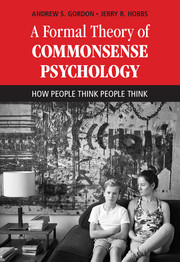Book contents
- Frontmatter
- Contents
- Part I Commonsense Psychology
- Part II Background Theories
- Introduction
- 5 Eventualities and Their Structure
- 6 Traditional Set Theory
- 7 Substitution, Typical Elements, and Instances
- 8 Logic Reified
- 9 Functions and Sequences
- 10 Composite Entities
- 11 Defeasibility
- 12 Scales
- 13 Arithmetic
- 14 Change of State
- 15 Causality
- 16 Time
- 17 Event Structure
- 18 Space
- 19 Persons
- 20 Modality
- Part III Commonsense Psychology Theories
- Appendix A First-Order Logic
- References
- Index
14 - Change of State
from Part II - Background Theories
Published online by Cambridge University Press: 01 September 2017
- Frontmatter
- Contents
- Part I Commonsense Psychology
- Part II Background Theories
- Introduction
- 5 Eventualities and Their Structure
- 6 Traditional Set Theory
- 7 Substitution, Typical Elements, and Instances
- 8 Logic Reified
- 9 Functions and Sequences
- 10 Composite Entities
- 11 Defeasibility
- 12 Scales
- 13 Arithmetic
- 14 Change of State
- 15 Causality
- 16 Time
- 17 Event Structure
- 18 Space
- 19 Persons
- 20 Modality
- Part III Commonsense Psychology Theories
- Appendix A First-Order Logic
- References
- Index
Summary
THE change PREDICATE
It is hard to imagine a universe without change. It is even harder to imagine cognition in such a universe. Change of state is very nearly the most basic concept human beings are equipped with. We could not survive very long without recognizing the changes in our environment. Our very sense of time arises from our awareness of change.
We will represent change of state with the predicate change relating two eventualities. The expression (change e1 e2) says that eventuality e1 changes into eventuality e2. Moving is a change from being at one place to being at another. Growing up is a change from being small to being larger. Learning is a change from not knowing something to knowing it. And so on, for all the processes we are familiar with.
We cannot define change. It is too basic a concept in our minds. But there are a number of constraints we can express concerning the eventualities that are the arguments to change.
The arguments of change are eventualities.
They can be eventuality types or eventuality tokens. For example, the change may be from the door being open three inches to the door being open two inches, where both are eventuality tokens of the door being open. There is no assumption in the change predicate that the eventualities e1 and e2 precisely define the conditions before and after the change; we will see later that the two derivative predicates change From and change To will incorporate this assumption, and hence will apply primarily to eventuality types.
One might think there could be a magical change of a person into a cat, and this would be a change relation between entities that are not eventualities. But we view this as a change in properties of a single individual. There is an x such that first x is a person and then x is a cat.
A change of state is a change of state of something. It would be strange to say that there was a change from Bill Clinton's being president to the Red Sox winning the World Series. They have nothing to do with each other. So a further constraint on change is this.
- Type
- Chapter
- Information
- A Formal Theory of Commonsense PsychologyHow People Think People Think, pp. 158 - 162Publisher: Cambridge University PressPrint publication year: 2017



